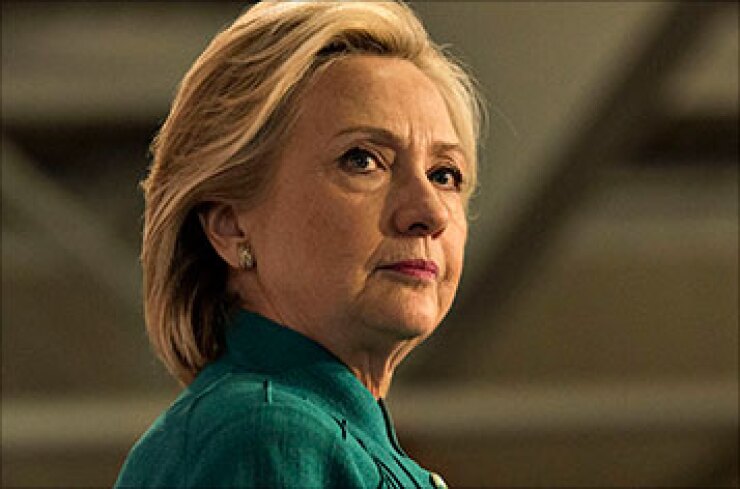
WASHINGTON — Pressure is mounting for Congress to make Puerto Rico's public entities eligible for Chapter 9 bankruptcy protection in the wake of an appeals court decision that found the territory's restructuring law illegal, and calls from top presidential candidates for congressional action.
At the same time, commonwealth officials are considering appealing the ruling to the U.S. Supreme Court, said a spokesman for Puerto Rico Attorney General Cesar Miranda-Rodriguez, who called the ruling "disappointing."
The ruling, handed down by judges from the U.S. Court of Appeals for the First Circuit in Boston late Monday, found the Puerto Rico Public Corporation Debt Enforcement and Recovery Act, enacted last year to allow the territory's cash-strapped utilities to restructure, is not valid and cannot be implemented because of the lack of bondholder consent.
The judges sided against the commonwealth and its cash-strapped Puerto Rico Electric Power Authority and in favor of two groups of holders of nearly $2 billion of PREPA bonds — Franklin California Tax-Free Trust and BlueMountain Capital Management.
The judges ruled the recovery law violates Section 903(1) of the U.S. bankruptcy code, which prohibits states from passing laws that would allow their public entities to restructure without the approval of those entities' creditors. The judges said the commonwealth is considered a state under bankruptcy law even though it was deemed ineligible for filing for bankruptcy protection under Chapter 9 in amendments to the bankruptcy code enacted in 1984.
"Congress preserved to itself that power to authorize Puerto Rican municipalities to seek Chapter 9 relief," appeals court Judge Sandra Lynch wrote in the majority decision.
Another of the three judges, Juan Torruella, disagreed with some of the points raised in the ruling and argued in a concurring opinion that the 1984 amendments are also invalid. He said there is no legislative basis for not allowing Puerto Rico public entities from seeking Chapter 9 relief.
Referring to the 1984 amendments, he said, "A tracing of its travels through the halls of Congress sheds less light than a piece of coal on a moonless night regarding the reason for its enactment. Thus, the majority's statement that 'Congress [sought to] preserve to itself th[e] power to authorize Puerto Rican municipalities to seek Chapter 9 relief, is pure fiction."
Meanwhile, the ruling and potential legislation may have a major impact on the presidential election because Florida, where many Puerto Ricans reside, has 29 electoral votes. On Tuesday Democratic presidential candidate and former secretary of state Hillary Clinton urged Congress to make the territory eligible for municipal bankruptcy.
"As a first step, Congress should provide Puerto Rico the same authority that states already have to enable severely distressed government entities, including municipalities and public corporations, to restructure their debts under Chapter 9 of the Bankruptcy Code," she said, adding, "We're not talking about a bailout, we're talking about a fair shot at success."
In April, Jeb Bush, a former governor of Florida and now a Republican presidential candidate, took the same position, telling a crowd in San Juan that, "Puerto Rico should be given the same rights as states." He has also called for Puerto Rican statehood.
Presidential candidate Sen. Bernie Sanders, I-Vt., said, "I strongly believe Puerto Rico should be afforded the same bankruptcy protections that exist for municipalities across the United States." We need to do everything we can to allow Puerto Rico to restructure its debt in a rational way that does not harm its people, ordinary investors or pension funds in the United States. Chapter 9 protections would be a good first step."
Pedro Pierluisi, Puerto Rico's non-voting member of Congress, who has introduced House legislation that would extend Chapter 9 powers to the struggling island, said Tuesday, "The Court of Appeals has concluded that 'Congress preserved to itself that power to authorize Puerto Rican municipalities to seek Chapter 9 relief.' This means that Puerto Rico has one option and one option only, namely to 'turn to Congress for recourse.'"
Pierluisi introduced, H.R. 870, the Puerto Rico Chapter 9 Uniformity Act, in February, but it has not moved since being referred to a subcommittee in March.
Sens. Richard Blumenthal, D-Conn., and Chuck Schumer, D-N.Y., are planning to introduce a companion bill to Pierluisi's as early as this week, according to a Blumenthal staffer.
Jeffery Farrow, co-chair of President Clinton's Interagency Group on Puerto Rico and a consultant to Akin Gump & ACG Analytics, said Puerto Rico's bankruptcy future is in congressional hands.
"I think the idea that there could be some other avenue other than federal law is pretty foreclosed now," Farrow said.
Robert Donahue, a managing director and research analyst with Municipal Market Analytics, said MMA believes Chapter 9 "is the best option among many uncertain options" for Puerto Rico, noting bankruptcy should only be used "as a last resort in a complete crisis situation."
Donahue added that MMA believes the ruling means Congress is more likely to get mobilized, but only if the situation on island worsens.
"If the Puerto Rican debt situation deteriorates into something potentially damaging to U.S. interests or the safety of US citizens living on the island, then Congress may have to act," Donahue said. "Congress may have to act if it appears that Puerto Rican risk is contagious to capital markets, becomes a black eye internationally or threatens the safety of U.S. citizens and tourists."





